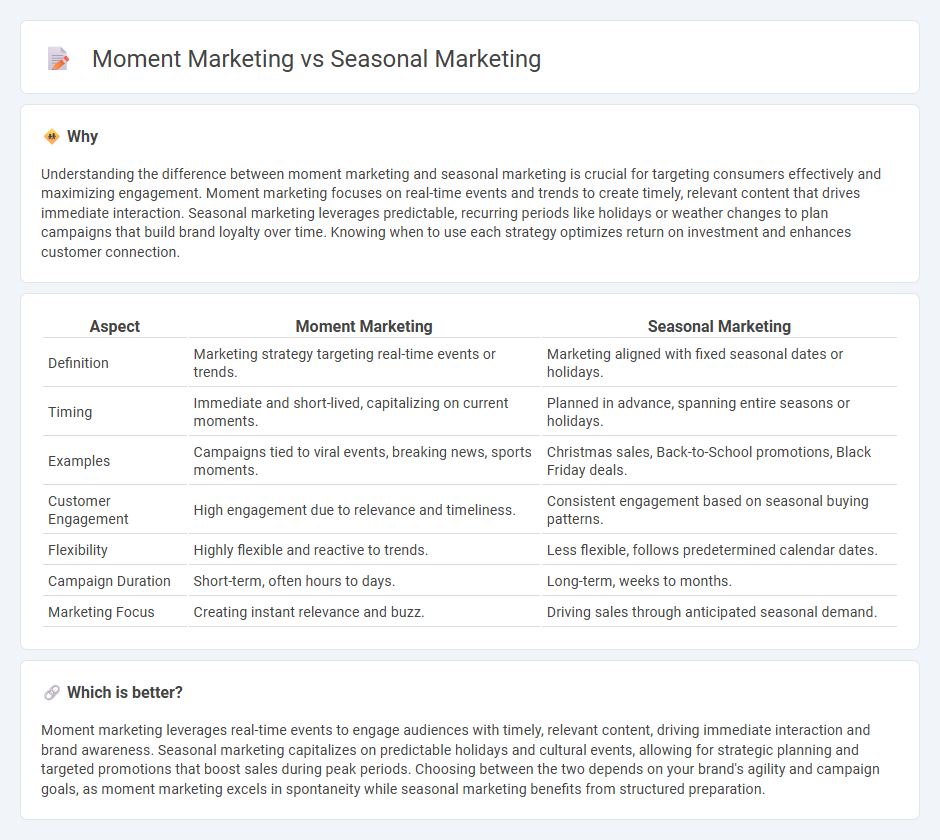
Moment marketing leverages real-time events and trending topics to engage audiences instantly, driving immediate brand relevance and consumer interaction. Seasonal marketing focuses on planned campaigns tied to specific periods or holidays, capitalizing on predictable consumer behaviors and traditions for long-term brand resonance. Explore the strategic benefits and best practices of moment marketing versus seasonal marketing to optimize your advertising impact.
Why it is important
Understanding the difference between moment marketing and seasonal marketing is crucial for targeting consumers effectively and maximizing engagement. Moment marketing focuses on real-time events and trends to create timely, relevant content that drives immediate interaction. Seasonal marketing leverages predictable, recurring periods like holidays or weather changes to plan campaigns that build brand loyalty over time. Knowing when to use each strategy optimizes return on investment and enhances customer connection.
Comparison Table
| Aspect | Moment Marketing | Seasonal Marketing |
|---|---|---|
| Definition | Marketing strategy targeting real-time events or trends. | Marketing aligned with fixed seasonal dates or holidays. |
| Timing | Immediate and short-lived, capitalizing on current moments. | Planned in advance, spanning entire seasons or holidays. |
| Examples | Campaigns tied to viral events, breaking news, sports moments. | Christmas sales, Back-to-School promotions, Black Friday deals. |
| Customer Engagement | High engagement due to relevance and timeliness. | Consistent engagement based on seasonal buying patterns. |
| Flexibility | Highly flexible and reactive to trends. | Less flexible, follows predetermined calendar dates. |
| Campaign Duration | Short-term, often hours to days. | Long-term, weeks to months. |
| Marketing Focus | Creating instant relevance and buzz. | Driving sales through anticipated seasonal demand. |
Which is better?
Moment marketing leverages real-time events to engage audiences with timely, relevant content, driving immediate interaction and brand awareness. Seasonal marketing capitalizes on predictable holidays and cultural events, allowing for strategic planning and targeted promotions that boost sales during peak periods. Choosing between the two depends on your brand's agility and campaign goals, as moment marketing excels in spontaneity while seasonal marketing benefits from structured preparation.
Connection
Moment marketing leverages real-time events and trending topics to create timely, relevant campaigns, while seasonal marketing focuses on predictable periods tied to holidays or seasons. Both strategies aim to maximize customer engagement by targeting specific emotional triggers and cultural contexts that influence consumer behavior. Integrating moment marketing into seasonal campaigns enhances brand visibility and drives higher conversion rates by capitalizing on immediate, context-driven opportunities.
Key Terms
**Seasonal Marketing:**
Seasonal marketing targets consumer behavior patterns linked to specific times of the year, like holidays, seasons, or annual events, driving tailored campaigns that boost engagement and sales during these periods. It leverages data on seasonal trends, shopping habits, and cultural festivities to optimize product launches, promotions, and advertising strategies for maximum impact. Explore more about how seasonal marketing can transform your business's approach to timely customer engagement and revenue growth.
Holiday Campaigns
Holiday campaigns leverage seasonal marketing by targeting predictable consumer behaviors tied to specific dates and festivities, enhancing brand visibility during peak shopping times. Moment marketing, however, capitalizes on real-time events and trending topics, creating timely, spontaneous interactions that generate immediate engagement and relevance. Explore the strategic advantages and implementation techniques of both holiday and moment marketing to maximize campaign impact and ROI.
Annual Trends
Seasonal marketing leverages predictable annual events like holidays, weather changes, and cultural festivals to target consumers with timely promotions and products, driving sales through established patterns. Moment marketing capitalizes on real-time, spontaneous events or trending topics, offering personalized and immediate engagement that resonates with current consumer sentiments. Explore in-depth strategies and examples to optimize your brand's impact throughout the year.
Source and External Links
Seasonal Marketing Strategies to Maximize Returns - Mailchimp - Seasonal marketing is a strategy where businesses tailor promotions, messaging, and products to specific times of the year, like holidays and seasonal events, to connect with consumers and increase sales by aligning with their changing needs and spending habits.
Seasonal Marketing: Benefits and How To Create a Campaign - Seasonal marketing involves creating promotions for certain times of the year, leveraging high-traffic periods such as holidays to generate excitement and urgency, encouraging customers to act through themed offers and limited-time deals.
How to plan a seasonal marketing campaign: A 5-step strategy - Effective seasonal campaigns focus on limited-edition products, seasonal discounts, and timely messaging to create a sense of exclusivity and FOMO, while careful planning ensures campaigns launch at the right moment for maximum impact.
 dowidth.com
dowidth.com